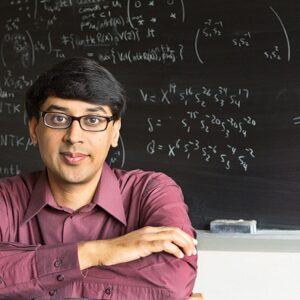Manjul Bhargava is an Indian-born Canadian-American mathematician who has made significant contributions to number theory. He is the R. Brandon Fradd Professor of Mathematics at Princeton University and the Stieltjes Professor of Number Theory at Leiden University. In 2014, he was awarded the Fields Medal, a prestigious prize granted to mathematicians under the age of 40. His mother, a mathematician at Hofstra University, introduced him to mathematical principles at an early age when he was born in Ontario, Canada, to parents who had immigrated from India. He developed into a brilliant student with a strong mathematical aptitude, completing all of his high school math and computer science classes by the age of 14. Following high school, he earned a B.A. from Harvard University, where he received the Morgan Prize for his undergraduate study. He was awarded a Hertz Fellowship to attend Princeton University, where he earned his doctorate and began a career in academia. Over the course of his career, he has made numerous significant contributions to mathematics, but he is most recognized for his 14 new Gauss-style composition laws, which he derived from the writings of German mathematical great Carl Friedrich Gauss.
Childhood & Early Life
Manjul Bhargava was born on 8 August 1974 in Ontario, Canada. His mother Mira Bhargava is a mathematician at Hofstra University.
His mother tutored him in mathematics from a young age and he excelled in the subject at school. By the time he was 14, he had completed all of his high school math and computer science courses.
He graduated from Plainedge High School in North Massapequa in 1992 as the class valedictorian. He proceeded to obtain his B.A. from Harvard University in 1996. A brilliant student, he won the 1996 Morgan Prize for his research as an undergraduate.
He was awarded a Hertz Fellowship which enabled him to pursue his doctorate from the Princeton University. He was supervised by Andrew Wiles and completed his Ph.D. in 2001.
In his Ph.D. thesis he generalized Gauss’s classical law for composition of binary quadratic forms to many other situations. His results yielded many practical applications, including the parametrization of quartic and quintic orders in number fields.
Career of Manjul
Manjul Bhargava embarked on an academic career after earning his doctorate and served as a visiting scholar at the Institute for Advanced Study in 2001-02 and at Harvard University in 2002-03.
He found success early on in his career and was appointed as a tenured Full Professor in 2003 at Princeton. Aged just 28 at that time, he was the second youngest to be offered tenure.
In 2010 ,he was appointed to the Stieltjes Chair in Leiden University. Bhargava was elected to the United States National Academy of Sciences in 2013. The academy is one of the highest disciplinary academic bodies in the country that houses subject matter experts who advise the government on issues related to science and technology.
Manjul Bhargava has made several contributions to mathematics, especially to number theory. He developed several new techniques of counting objects in algebraic number theory which revolutionized the ways in which fundamental arithmetic objects in algebraic number theory are understood. His research has given rise to several exciting applications.
About 200 years ago the German mathematician Carl Friedrich Gauss had discovered a remarkable ‘composition law’ for binary quadratic forms which is regarded as a central tool in algebraic number theory. Bhargava came up with a simpler geometrical technique to derive Gauss’s law. The technique he developed also allowed him to obtain composition laws for higher-degree.
Along with number theory he also made important contributions to the representation theory of quadratic forms, to interpolation problems and p-adic analysis, and to the study of ideal class groups of algebraic number fields.
Major Works of Manjul
Manjul Bhargava is best known for his works in number theory. He simplified Gauss’s classical law for composition of binary quadratic forms, and derived 14 new Gauss-style composition laws.
In collaboration with Arul Shankar, he proved that the average rank of all elliptic curves over Q (when ordered by height) is bounded. The duo also proved the Birch and Swinnerton-Dyer conjecture for a positive proportion of elliptic curves.
Awards & Achievements
He was given the Clay Research Award in 2005. The same year he also won the Leonard M. and Eleanor B. Blumenthal Award for the Advancement of Research in Pure Mathematics.
In 2012, Bhargava became the inaugural recipient of the Simons Investigator Award.
In 2014, he was awarded the prestigious Fields Medal “for developing powerful new methods in the geometry of numbers, which he applied to count rings of small rank and to bound the average rank of elliptic curves.”
He was honored with the Padma Bhushan, the third highest civilian award of India, in 2015.
Personal Life & Legacy
Bhargava calls himself “an Indian at heart” and has studied Sanskrit from his grandfather Purushottam Lal Bhargava, a well-known scholar of Sanskrit and ancient Indian history. He is also an accomplished tabla player and has received training under prominent gurus such as Zakir Hussain.
Estimated Net Worth
Manjul Bhargava’s net worth is believed to be $ USD 4 million, with a primary source of income as a university instructor and mathematician.


